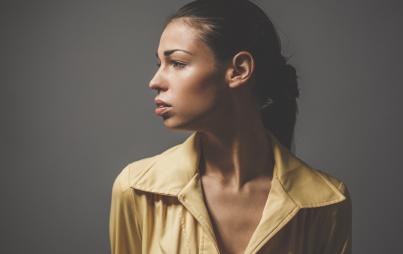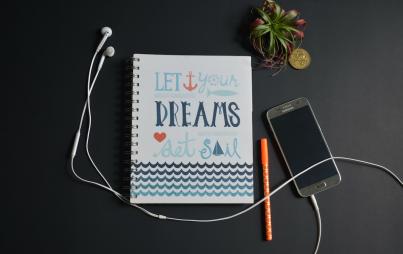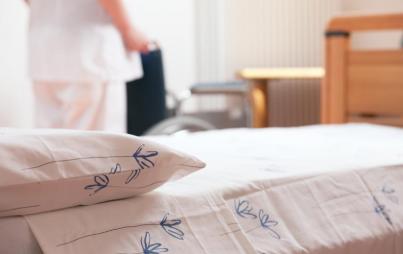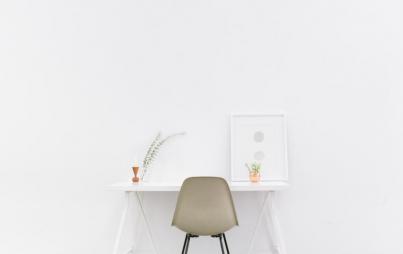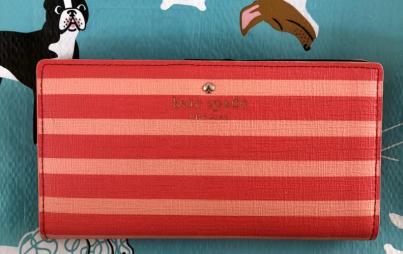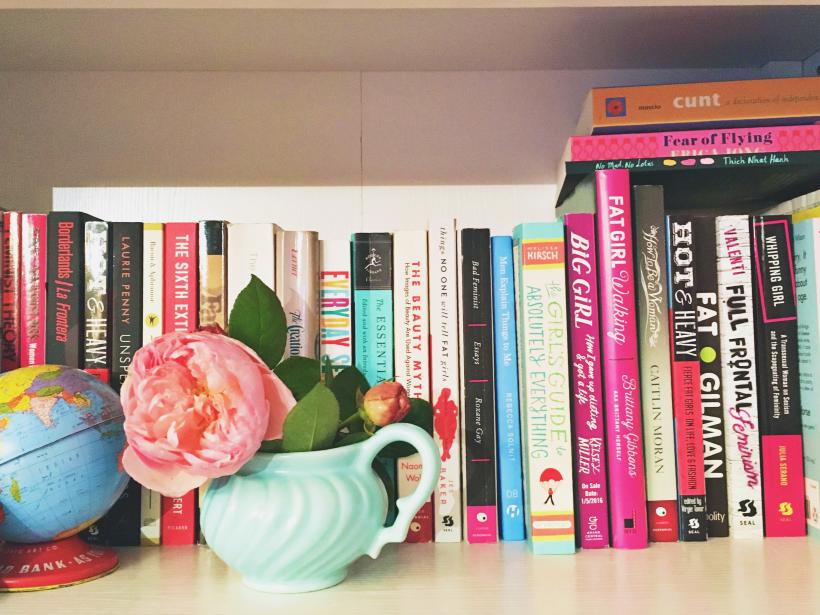
Sometimes my brain makes me think things = happiness. Image: Joni Edelman.
Can I just like my things without over-intellectualizing it, without turning my love (or lack thereof) of things into a movement?
I am 8.
Huddled under a daisy-covered comforter — the kind that used to be ugly, but now lies proudly across a hipster’s bed — I’m planning. Scanning my room by the light of a streetlamp in the alley outside, picking the most important things — I am planning.
-
Perpetual calendar, featuring portrait of my dad and me (printed in dot-matrix)
-
Woody Woodpecker piggy bank (contains $1.47 in change)
-
Assorted stuffed toys (bear, buffalo, dog)
-
Tiger painting (16x20, wood frame, tacky)
In that order.
I’m planning how to escape in a home invasion robbery, earthquake, or inevitable house fire. I’m planning the order in which I should grab the tiger and the calendar and Woody Woodpecker, based on their size and difficulty to transport.
There is only $1.47 inside Woody; it doesn’t matter.
It doesn’t matter that the dot matrix calendar is just paper — and ugly paper at that.
It doesn’t matter, because my dad lives 2280 miles away, and the calendar is what I have of him here, the tangible piece of him hanging next to a creased Barry Manilow album insert.
So it’s number one on the list.
“Somewhere Down The Road,” indeed, Barry.
I decide I can wrap all of this in the daisy blanket and tie it up Santa-Claus-gift-sack-style and drag it. Unless my bedroom is on fire — in which case, I guess I’ll just jump out of the window into the alley.
But I’m definitely grabbing the calendar.
♦♦♦
I am 41. I try KonMari because it seems like a great idea. I end up with a huge pile of shit in my family room with which I can’t bear to part, and which I now need to reorganize.
My husband and I argue over the importance of “stuff.”
“It’s just STUFF!” he says, loudly.
“You don’t UNDERSTAND!” I say (loudly) back. Out of spite, I cry and throw a 60-year-old vase in a box. It shatters into a thousand fragments of turquoise pottery.
I can’t separate my privilege from my possessions, but I also know this isn’t just about that.
I pull down a pile of cookbooks full of recipes for molded jello and crêpes I’ll never make, the ones that have been mostly collecting dust since I was 18. I throw them in a box of other books (next to the pottery disaster) that I decided didn’t (or shouldn’t) “spark joy”: What to Expect, 20 or so fiction novels, an extra Bible. Who needs cookbooks anymore?
I take The Joy of Cooking out for posterity. I can justify one cookbook.
Now to the shelf of knick-knacks, tchotchkes, bric-a-brac: words meant to make crap seem cute. Items that just look like things to everyone else, things I collected before this life with my new husband and my new children in this new house.
Pieces of my life — some connected to a memory, some connected to nothing but my want of them.
Crap. Stuff. I sweep 90% of it into a box. I cry. It’s just stuff.
It’s just stuff.
I have a lot of it, I guess — more that the average person, slightly less than a hoarder.
I know my more-than-average amount of stuff is related to my higher-than-average wealth, which makes me self-conscious — especially as someone who used to have to budget groceries to the dime.
I can’t separate my privilege from my possessions, but I also know this isn’t just about that. It’s deeper than that.
I realize I don’t need the stuff. But I want it.
After the KonMari fail and the fight with my husband about the stuff (which followed with us into therapy, never really resolving), I asked my friend Staci why I have so much shit, why this decluttering is so impossible.
I asked her, “Am I actually a hoarder and don’t realize it?”
Staci has known me since I was 11. She knows about my mother’s addiction, my too-early adulthood, Barry, the calendar, the tiger, the irrational fear of catching on fire in the middle of the night.
“Permanence. Security,” she said.
Permanence. Security.
Minimalism looks so romantic.
Jean Piaget’s theory of cognitive development says that a baby cries when their mother leaves their sight, simply because they don’t have the intellectual capacity to understand that even though they can't see her, she still exists. As far as they know, she’s never coming back. Object permanence, he calls it.
This makes me think about my childhood. The number of times I was left that I can recall. The times I was left that I can’t recall.
Did I never learn that things you can’t see still are still there? Did I ever feel secure?
Do I fancy myself a 41 year old with seven shelves of crap, when in reality I'm actually eight months old?
Or can I just like my things without over-intellectualizing it, without turning my love (or lack thereof) of things into a movement? Is being surrounded by all of these things greed? Gluttony?
I’m not sure.
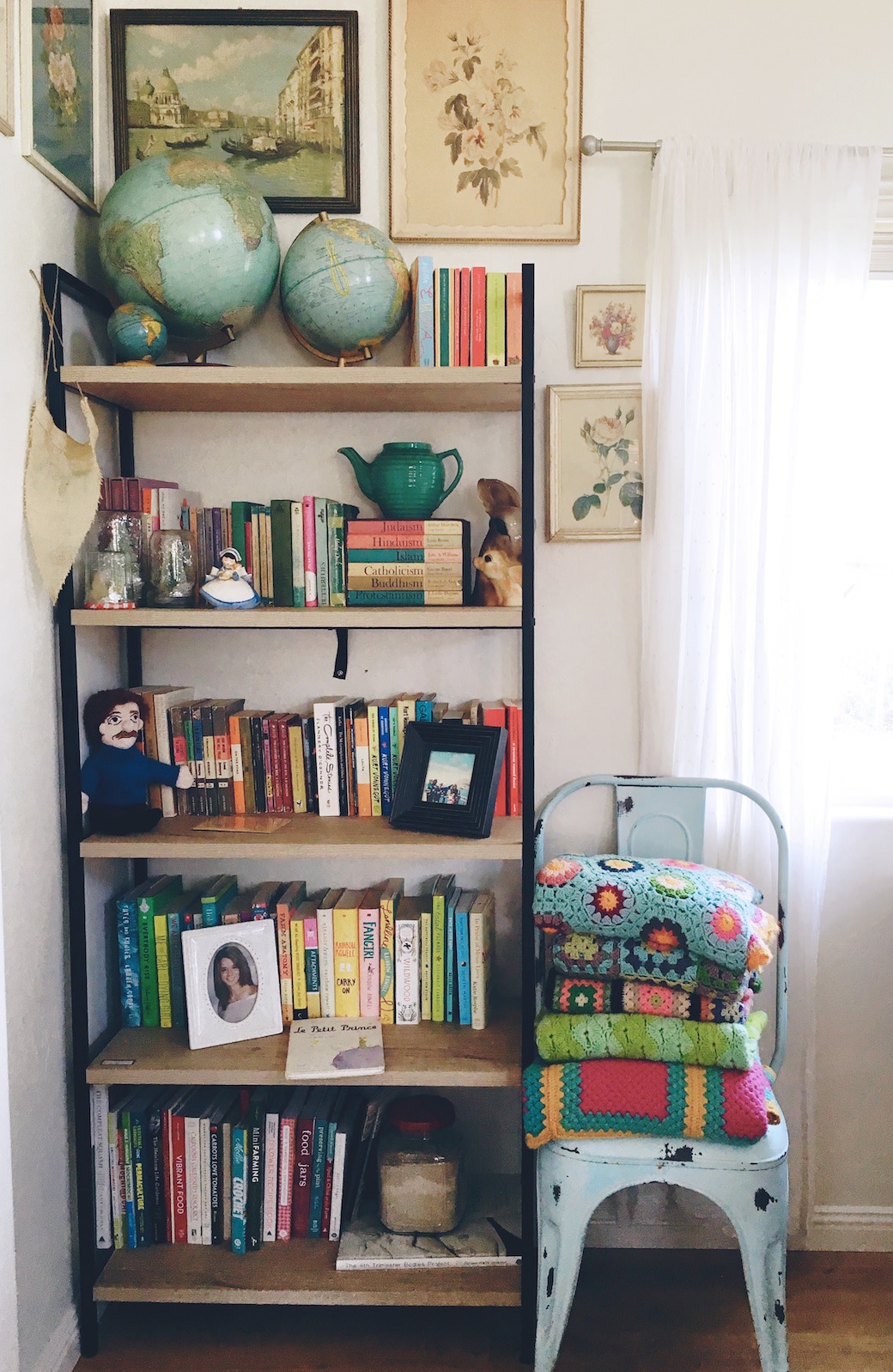
I have OCD, which means my books need to be lined up in an order that makes sense to me. I have bipolar disorder, which means that sometimes my brain makes me think things = happiness, regardless of the number of meds I’m swallowing every day.
I’m the oldest daughter of an addict who is still figuring out what functioning looks like. I realize that having 17 aqua vintage vases looks, and maybe even is, dysfunctional.
But I like my things. I put them on the shelf and there they are: Vases in a row. China stacked in the cupboard. Shelf after shelf of books, organized by genre. Sixty-year-old mixing bowls on my counter.
I’ll never use them, it doesn’t matter. I want them there.
I guess I’m not supposed to. But I do.
Minimalism looks so romantic: The contentedness of the one nonfiction book you checked out from the library, the one mug you always drink your coffee out of. The tiny house. One beloved sweater that you wear every day in the Portland rain. One favorite pair of jeans you wear until they disintegrate. One pair of Wellies, preferably Hunter. One pair of socks knit with one hank of yarn until they are complete, instead of five projects simultaneously under construction, and a yarn stash that fills six Ikea bins.
The abundance of physical space that sometime translates to enviable emotional space.
I see that and then I want that.
Kind of.
Not really.
I feel guilty that I love so many things.
More accurately, I guess, I want to want to buy into minimalism. I see my friends with two things on their bathroom counter — a hand soap pump, a cup — and I think, That must be easy to clean.
I look at my own counter: a vintage Ball jar full of Qtips. A teacup that holds water for that cat. A 50s pottery planter that I’ve turned into a soap dish. A metal tray with 11 different face lotions/sprays/treatments — none of which do anything. A stack of three face masks from Lush (two of which I forgot to refrigerate — OOPS).
And I just like it.
My dresser has a stack of books eight high that I am reading and reviewing (it’s taking a while), an old sewing-basket-turned-junk-holder (contents: three watches that need batteries, a bracelet in 18 pieces, a hospital band from when my last child was born, two pictures of me when I was a baby, one picture of my ex-husband when he was a baby [no idea], my pin from nursing school graduation [gold], children's teeth [don’t ask]), another aqua pottery vintage vase (I’m running out of places for vintage vases), an embroidered dresser scarf that has a flower and a basket on it.
I see my friends with one jewelry organizer on their dresser and I think, Where do they put their stack of eight books?
I think, I have too much.
I think, This is privilege.
I think about living in 300 square feet, or 500 or 1000, and I think, Where would I put my things? And I feel guilty that I love so many things. I worry, Is this love just further evidence of my brokenness? Are the 23 vintage sheets stacked in my closet really necessary?
Well, no. But also yes.
It’s complex.
I don’t need them, but I want them. I just want to put them somewhere and know that when I’m not looking at them, they are still there.
Object permanence.
The vases that belonged to someone's grandmother's mother. The mosaic map of the United States that doesn’t have any identifying factors except for a tiny red stone to mark state capitals (so it’s basically useless). The extra set of china I use maybe once a year. A thousand books I could read on one Kindle.
All necessary. All unnecessary.



